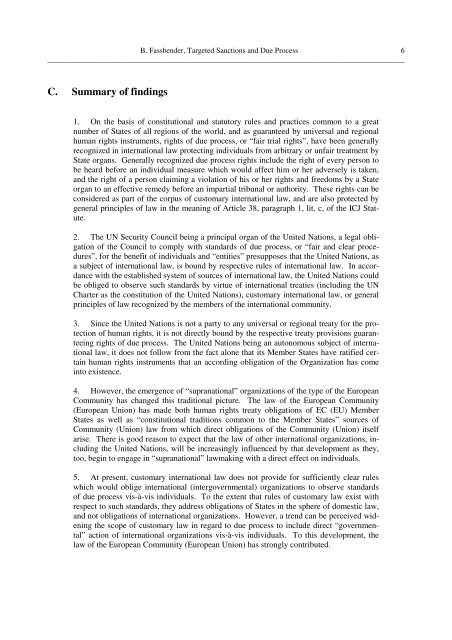Targeted Sanctions and Due Process - United Nations Treaty ...
Targeted Sanctions and Due Process - United Nations Treaty ...
Targeted Sanctions and Due Process - United Nations Treaty ...
You also want an ePaper? Increase the reach of your titles
YUMPU automatically turns print PDFs into web optimized ePapers that Google loves.
B. Fassbender, <strong>Targeted</strong> <strong>Sanctions</strong> <strong>and</strong> <strong>Due</strong> <strong>Process</strong><br />
6<br />
______________________________________________________________________________________________<br />
C. Summary of findings<br />
1. On the basis of constitutional <strong>and</strong> statutory rules <strong>and</strong> practices common to a great<br />
number of States of all regions of the world, <strong>and</strong> as guaranteed by universal <strong>and</strong> regional<br />
human rights instruments, rights of due process, or “fair trial rights”, have been generally<br />
recognized in international law protecting individuals from arbitrary or unfair treatment by<br />
State organs. Generally recognized due process rights include the right of every person to<br />
be heard before an individual measure which would affect him or her adversely is taken,<br />
<strong>and</strong> the right of a person claiming a violation of his or her rights <strong>and</strong> freedoms by a State<br />
organ to an effective remedy before an impartial tribunal or authority. These rights can be<br />
considered as part of the corpus of customary international law, <strong>and</strong> are also protected by<br />
general principles of law in the meaning of Article 38, paragraph 1, lit. c, of the ICJ Statute.<br />
2. The UN Security Council being a principal organ of the <strong>United</strong> <strong>Nations</strong>, a legal obligation<br />
of the Council to comply with st<strong>and</strong>ards of due process, or “fair <strong>and</strong> clear procedures”,<br />
for the benefit of individuals <strong>and</strong> “entities” presupposes that the <strong>United</strong> <strong>Nations</strong>, as<br />
a subject of international law, is bound by respective rules of international law. In accordance<br />
with the established system of sources of international law, the <strong>United</strong> <strong>Nations</strong> could<br />
be obliged to observe such st<strong>and</strong>ards by virtue of international treaties (including the UN<br />
Charter as the constitution of the <strong>United</strong> <strong>Nations</strong>), customary international law, or general<br />
principles of law recognized by the members of the international community.<br />
3. Since the <strong>United</strong> <strong>Nations</strong> is not a party to any universal or regional treaty for the protection<br />
of human rights, it is not directly bound by the respective treaty provisions guaranteeing<br />
rights of due process. The <strong>United</strong> <strong>Nations</strong> being an autonomous subject of international<br />
law, it does not follow from the fact alone that its Member States have ratified certain<br />
human rights instruments that an according obligation of the Organization has come<br />
into existence.<br />
4. However, the emergence of “supranational” organizations of the type of the European<br />
Community has changed this traditional picture. The law of the European Community<br />
(European Union) has made both human rights treaty obligations of EC (EU) Member<br />
States as well as “constitutional traditions common to the Member States” sources of<br />
Community (Union) law from which direct obligations of the Community (Union) itself<br />
arise. There is good reason to expect that the law of other international organizations, including<br />
the <strong>United</strong> <strong>Nations</strong>, will be increasingly influenced by that development as they,<br />
too, begin to engage in “supranational” lawmaking with a direct effect on individuals.<br />
5. At present, customary international law does not provide for sufficiently clear rules<br />
which would oblige international (intergovernmental) organizations to observe st<strong>and</strong>ards<br />
of due process vis-à-vis individuals. To the extent that rules of customary law exist with<br />
respect to such st<strong>and</strong>ards, they address obligations of States in the sphere of domestic law,<br />
<strong>and</strong> not obligations of international organizations. However, a trend can be perceived widening<br />
the scope of customary law in regard to due process to include direct “governmental”<br />
action of international organizations vis-à-vis individuals. To this development, the<br />
law of the European Community (European Union) has strongly contributed.
















